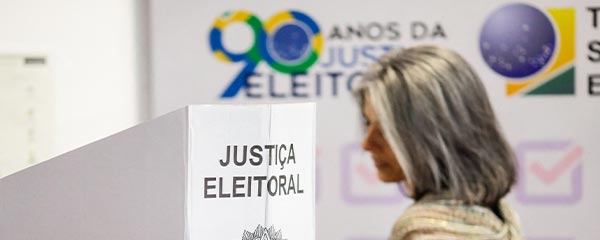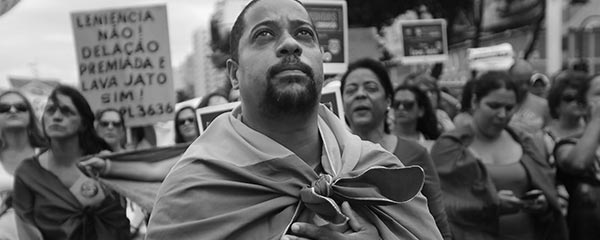Ahead of Brazil's general election this week, most polls continue to show former President Luiz Inacio Lula da Silva leading sitting President Jair Bolsonaro, who is seeking a second term.
Results from Gallup surveys in Brazil offer some insight into what is shaping Brazilian voters' choices and the advantages and disadvantages for the two front-runners -- one a populist incumbent and the other a popular former president who led the country from 2003 to 2010.
The Economy: Advantage Bolsonaro
After contracting significantly during 2020, Brazil's economy began to recover in 2021 and continues to do so this year. Gross domestic product grew 1.2% in the second quarter of 2022 compared with the first quarter and was up 3.2% year on year.
Against this backdrop, the majority of Brazilians (58%) surveyed in late July and early August saw their standard of living getting better, while slightly more than one in five (22%) saw their situation getting worse. These numbers are slightly improved from where they were in 2021 and in line with sentiment in 2020.
Throughout most of Bolsonaro's first term, the majority of Brazilians have been upbeat about their living standards, but notably not nearly to the same level as they were throughout da Silva's presidency.
Brazilians' buoyant outlook even as they feel the pinch from rising prices may reflect the significant increases in government transfers to low-income families under different programs, which Bolsonaro has pledged to maintain if reelected. Shortly before Gallup's survey, Brazil's Senate and lower house approved Bolsonaro's $7.6 billion aid package designed to aid poor families and truckers facing sustained high inflation.
Brazilians also may be feeling upbeat because they are facing fewer of the inconveniences and threats posed by COVID-19, which was particularly disruptive in Brazil. Bolsonaro's handling of it was considered ill-advised; more than half a million Brazilians died during the pandemic. Brazilians may feel relieved as their country recovers -- and see things getting better.
However, the optimism that Brazilians feel about their living standards may be a fragile advantage for Bolsonaro. At the same time that Brazilians feel their personal situation is getting better, they are less sanguine about the direction of their economy than they have been in the past few years, when a slim majority said conditions were getting better. In fact, the 49% of Brazilians who see local economic conditions improving is the same as Bolsonaro's first year in office.
Corruption: Disadvantage Bolsonaro
If Bolsonaro was hoping to boost his approval ratings by pushing through an aid package before the election, the immediate gains look meager. He remains unpopular on the whole. Nearly four in 10 Brazilians (38%) approve of the job Bolsonaro is doing as president -- which is similar to the 35% who said so in 2021.
One of the factors likely hurting his job approval is also one of the reasons that Brazilians voted for him in 2018: corruption. Bolsonaro ran on an anti-corruption platform, which resonated with voters who were reeling from a series of corruption scandals and the impeachment of President Dilma Rousseff on the grounds of illegal and unethical appropriation of public funds.
Bolsonaro himself has been the focus of corruption scandals during his presidency, and Brazilians are just as likely to see corruption as widespread in government today (69%) as they were when Bolsonaro took office.
Treatment of Women: Disadvantage Bolsonaro
The perception that women in Brazil are not treated with respect and dignity precedes Bolsonaro taking office -- and his lengthy history of making misogynistic statements that many women consider disrespectful and offensive. However, it is likely not earning him many points on his job performance.
In the lead-up to the election, 21% of Brazilians say women in their country are treated with respect and dignity, which is neither the lowest percentage on record (17% in 2020) nor the highest (26% in 2015).
Confidence in Elections: Disadvantage Brazil's Democracy
Beyond the issues that divide the candidates and are typically seen in any electoral contest, there is a serious threat to democracy in Brazil. Bolsonaro has said he may not accept the election results under the current voting system. He has argued that electronic voting machines are prone to fraud.
These claims may find fertile ground in the low trust Brazilian people have in the electoral system. Three in 10 Brazilians say they have confidence in the honesty of elections. Although that percentage has been much lower historically, the difference now is that an incumbent president is aligning with and spreading that sentiment.
For a democracy that is not even half a century old, this is a major challenge. More than any public policy issue, what may be at stake in the coming election in Brazil may be democracy itself.
Gerver Torres is a research adviser for Gallup and a senior associate at CSIS.
To stay up to date with the latest Gallup News insights and updates, follow us on Twitter.




